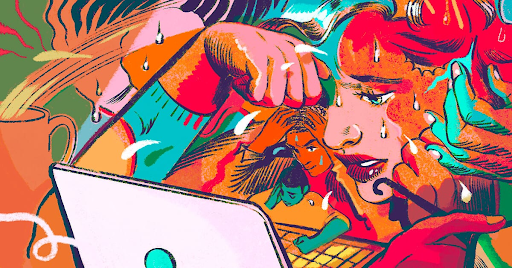This Could be YOU!
3/5/20234 min read


I could hardly wake up in the mornings. I felt extremely groggy and literally had to drag myself out of bed to get my children and myself to school and work. Often, when my husband took the children to school, I would be late for work. I simply had no energy nor drive and was just going through the motions.
During the day my work kept me constantly busy, of course, so I had no time to fall asleep, except that, I began to notice that when I sat, for a even a short while in meetings, I would be “nodding off”.
I would even be falling asleep while driving, so I would play music loudly and sing along, or talk out loud to myself to try to stay awake. When I got home I would collapse into bed and sometimes never wake up until the following morning, still in my clothes from the previous day. Yes, it was that bad!
Eventually, I could not sleep at nights. My mind would keep going - racing thoughts the doctors called it. I simply could not wind down enough to fall asleep. At some point in the wee hours of the morning, after tossing and turning all night, my body would shut down out of sheer exhaustion, and when I opened my eyes I felt more tired than when I first lay down.


Then came the sleeping pills…diagnosed by my doctor. Ooooooooh chile!!! I did NOT continue with those. One minute I’m taking a pill and talking to my husband, the next instant I’m waking up in the morning. Freaky!!! No thanks!!!!!
Does any of that sound like you? I hope not, but If so, THIS COULD BE YOU! You may be experiencing BURNOUT.


Burnout is a state of emotional, physical, and mental exhaustion caused by prolonged stress. It can happen to anyone, regardless of their job or industry.
Here are some common signs of burnout:
Feeling exhausted and drained: tired and depleted, both physically and emotionally.
A decline in productivity, creativity, and overall performance, as well as a lack of motivation and engagement.
Emotional detachment or disconnection from work, colleagues, or personal life.
A negative outlook on work and life in general, with feelings of cynicism, pessimism, and hopelessness.
Physical symptoms such as headaches, stomach problems, and sleep disturbances.
Neglect of self-care, such as exercise, healthy eating, and getting enough rest.
Feeling of a lack of control over circumstances or workload, leading to feelings of helplessness and despair.
If this is you, I bet you thought you were the only one going through something like this huh?
If you are experiencing any of these symptoms, don’t ignore them hoping they would go away.
Don’t try to hide them in fear that your “boss” or co-workers would think you are weak, or incapable of doing your job, or that your family and friends would think less of you and reject you. You may be surprised at how understanding and helpful they could be.
Don’t continue to push yourself and remain under undue levels of stress and pressure with thoughts like - “I must be strong”; or “If ah waaah gud, mih nose haffi run”, or other such “pep talk”.
It is important for you to take immediate steps to address or avoid burnout and take care of your mental and physical health, including seeking medical attention to rule out other health issues. Here’s why.
About one week after being prescribed sleeping pills, I experienced what was later diagnosed as a PANIC ANXIETY ATTACK. Let’s just say, I thought I was dying. I called my husband with “instructions” regarding the children…. in my absence.
I survived that episode (you must have guessed LOL) but was ordered by my doctor to proceed immediately on six (6) weeks of sick leave. Yes, that is correct. Six (6) weeks.
I would have many more of those “attacks” and they would take various forms, from severe chest pains to violent shivering, to giddyness, and others at different points, but over time I did recover, with lots of rest and selfcare.
Here are some strategies I use, and you can use too, to avoid or recover from burnout:


Prioritize self-care: Take care of your physical, emotional, and mental health. This includes getting enough sleep, eating a healthy diet, taking supplements, exercising regularly, and practicing mindfulness or meditation. This includes spending time with God in prayer and meditating on the Word.
Set boundaries: Learn to say no to additional responsibilities or commitments that you don't have the capacity to take on. Also, ensure that you have adequate time for rest and relaxation outside of work.
Manage your workload: Break up tasks into smaller, manageable chunks and focus on completing them one at a time. Use time management techniques to stay on task and avoid procrastination.
Seek support: Connect with friends, family, or colleagues who can provide emotional support or mentorship.
Seek professional help, such as medical check ups, therapy, counseling, or coaching if you're feeling overwhelmed.
Practice gratitude: Take time to appreciate the positive aspects of your work and life. Focus on what you're grateful for, rather than dwelling on negative thoughts or feelings.
Remember that by taking the simple (but NOT always easy) steps outlined above, you can prevent burnout, or regain and maintain your overall well-being.
YOUR WEEKEND RESET TIP THIS WEEK:
Assess yourself or schedule a visit with your doctor to determine if you are experiencing, or could be on the way to experiencing, burnout.
From the list of strategies above, develop your own strategy to change what you must in order to avoid burnout.If you need to make changes to avoid or recover from burnout, you do not need to do it alone.
You can reach out to me for a free coaching session HERE, and join my Recharge & Reset Community of women who are together learning to overcome self-sabotaging behaviours, and are fulfilling their God-given purpose, realizing their full potential, and living an abundant life.
